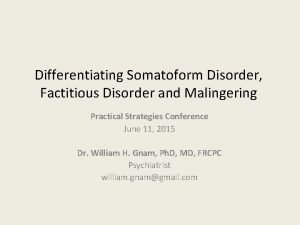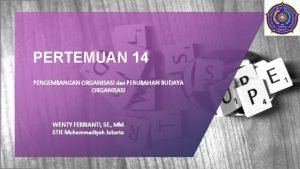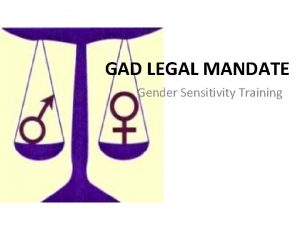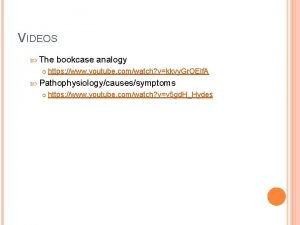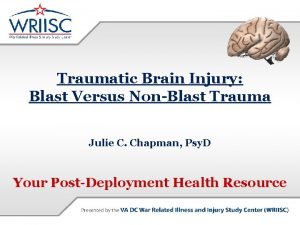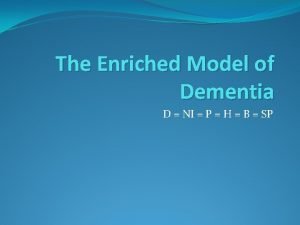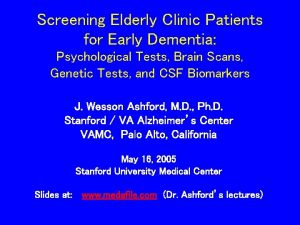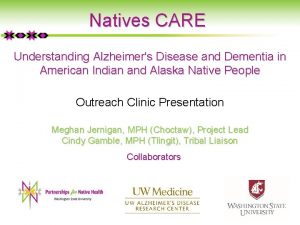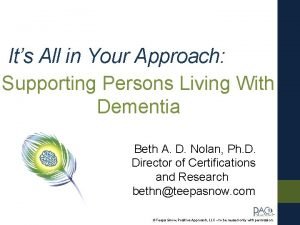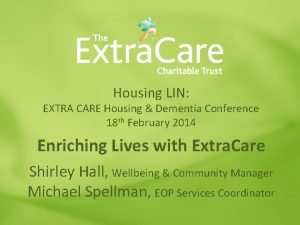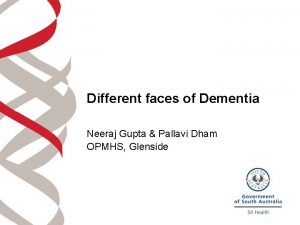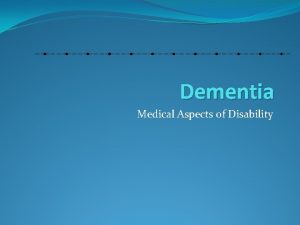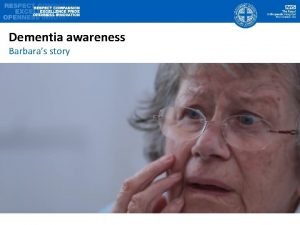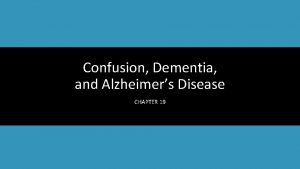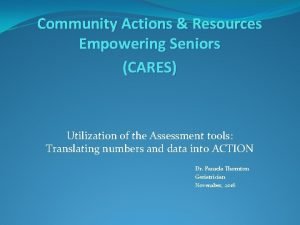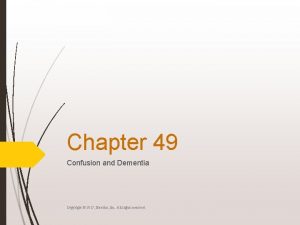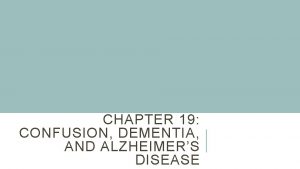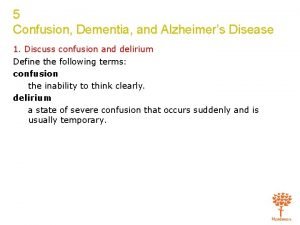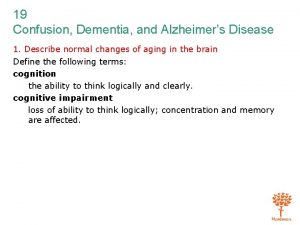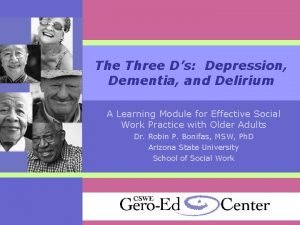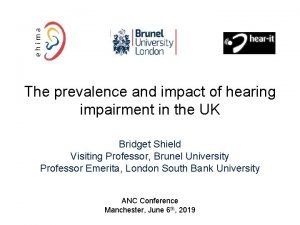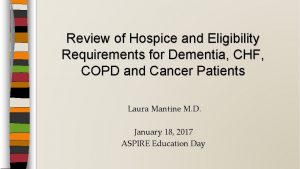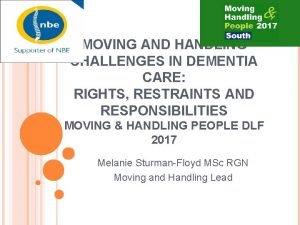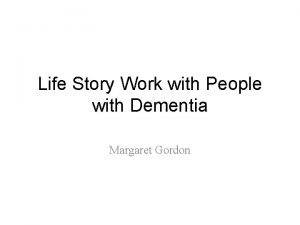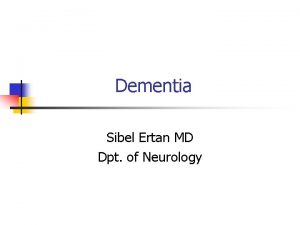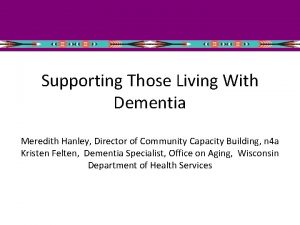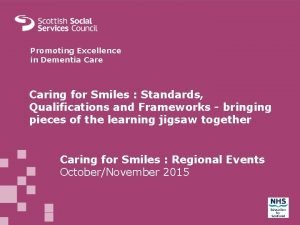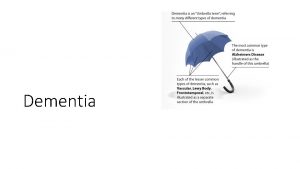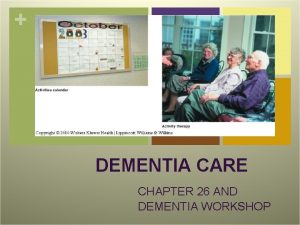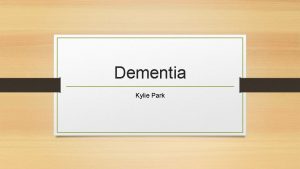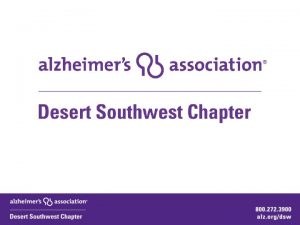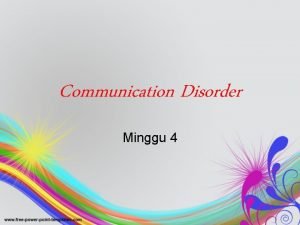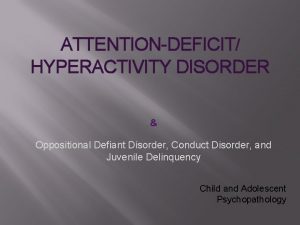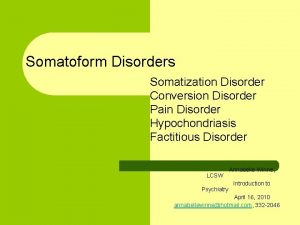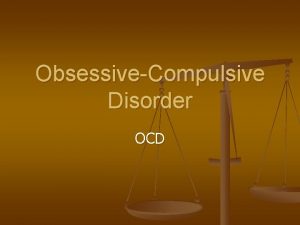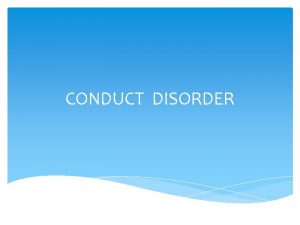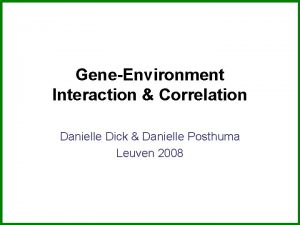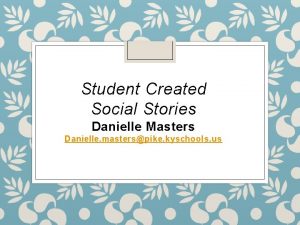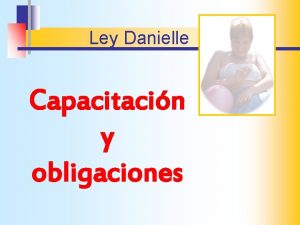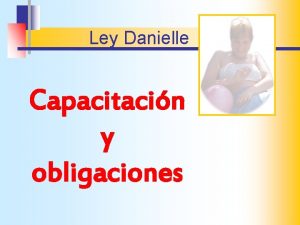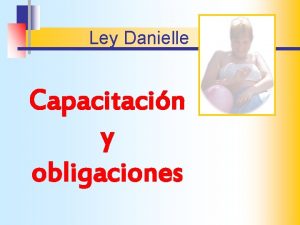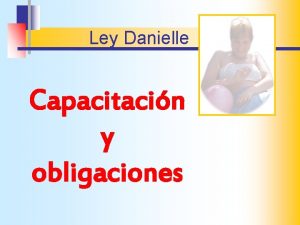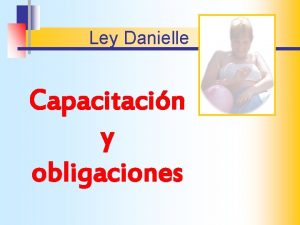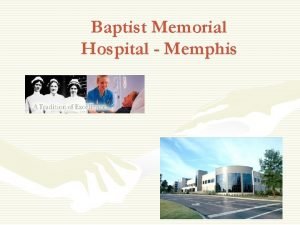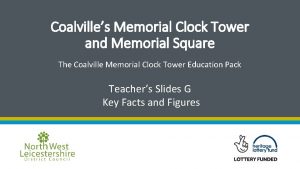Dementia Sensitivity Training Danielle ValerySarasota Memorial HospitalMemory Disorder



























- Slides: 27

Dementia Sensitivity Training Danielle Valery/Sarasota Memorial Hospital/Memory Disorder Clinic Provided by the Florida Department of Elder Affairs in partnership with the Memory Disorder Clinic at Sarasota Memorial Hospital and the Area Agency on Aging for Southwest Florida

Learning Objectives • To gain a better understanding of Alzheimer’s disease and related dementias, including common symptoms, causes, and progressive stages; • To increase awareness of behavioral symptoms associated with dementia; • To equip others to communicate effectively with persons with dementia; and • To discuss local resources available to assist those with dementia, their families, and caregivers.

Dementia Friendly America • Dementia Friends USA is part of a global movement that is changing the way people think, act, and talk about dementia. Anyone can be a Dementia Friend – we all have a part to play in creating dementia friendly communities! • A Dementia Friend is someone who, through viewing a series of online videos or attending an in-person session, learns about what it's like to live with dementia and then turns that understanding into action. From telling friends about the Dementia Friends program to visiting someone who is living with dementia, every action counts.

Florida • Florida has the second highest incidence rate of Alzheimer’s Disease in the nation – only behind California. • There approximately 560, 000 individuals currently living with Alzheimer’s Disease in Florida • By 2025, it is estimated 720, 000 individuals will be living with Alzheimer’s disease in Florida. • As of 2018, there approximately 1, 141, 000 unpaid caregivers in Florida that care for loved ones with Alzheimer’s disease or a related dementia. • Alzheimer’s disease is the 6 th leading cause of death across all ages in the United States. • Of those with dementia that live in the community in the United States, 26 % live alone Source: Alzheimer’s Association. (2019, March). Alzheimer’s Disease Facts and Figures. https: //www. alz. org/alzheimers-dementia/facts-figures

The Dementia Care and Cure Initiative (DCCI) Mission: To engage communities across the state to be more dementia friendly, promote better care for Floridians affected by dementia, and support research efforts to find a cure. Vision: To see all Florida communities engaged in providing better care for those affected by dementia while we work towards a cure. Goals: • Increase awareness of dementia and of services and supports for those with dementia, their families, and caregivers. • Provide assistance to dementia-caring communities. • Continue advocacy for care and cure programs.





Florida, Sarasota, and Surrounding Counties County Sarasota Manatee De. Soto Highlands 65 and Older Population 143, 766 98, 295 6, 768 34, 851 Probable Alzheimer's Cases (65+) 21, 235 13, 166 848 5, 038 This does not include any other form of dementia, including Vascular Dementia and Lewy Body Dementia. Source: DOEA, 2018 Florida County Profiles


10 Early Signs and Symptoms of Dementia 1. Memory loss that disrupts daily life 2. Changes in planning or solving problems 3. Difficulty completing familiar tasks 4. Confusion with time or place 5. Trouble understanding visual images and spatial relationships 6. New problems with words in speaking or writing 7. Misplacing things or losing the ability to retrace steps 8. Decreased or poor judgement 9. Withdrawal from work or social activities 10. Changes in mood and personality Source: Alzheimer’s Association. (2019). 10 Early Warning Signs and Symptoms of Alzheimer's. https: //www. alz. org/alzheimers-dementia/10_signs

Changes in Communication Due to Dementia • Difficulty finding the right words • Uses familiar words repeatedly • Describes familiar objects rather than calling them by name • Easily loses train of thought • Difficulty organizing words logically • Reverts to speaking a native language • Speaks less often • Relies on gestures more than speaking Source: Alzheimer’s Association. (2019). Communication and Alzheimer’s. https: //www. alz. org/help-support/caregiving/daily-care/communications

Response to Behavior Talk Tactics Take it slow Ask simple questions Limit reality checks Keep eye contact Source: Alzheimer’s Association. (2014). Quick Tips for First Responders. https: //www. alz. org/media/Documents/alzheimers-dementia-first-responder-quick-tips. pdf

Best Ways to Communicate • Approach the person from the front. • Speak clearly and be patient. • Listen closely. • Smile warmly and make eye contact. • Respond to a look of distress. • Avoid arguing. • If a customer repeats a question, respond as if you have not answered it before. • If a customer is asking for something that you have already brought them, show them where that item is on the table. Source: Alzheimer’s Association. (2019). Communication and Alzheimer’s. https: //www. alz. org/help-support/caregiving/daily-care/communications Adapted with permission.

Dementia Friends USA Getting Started • What is Dementia Video • Library Video

Dementia Friends USA • Restaurant Video • Bank Video

Dementia Friends USA • Faith Communities Video • Clinical Research

Wandering Six in 10 people with dementia will wander at some point – whether by foot, car, or public transportation. What should you do? • Personally identify yourself. • Stay calm, move and talk slowly, reassure safety. • Try to get identifying information. Check to see if the person has a personal identification on them or a medical bracelet/necklace • Use Talk Tactics communication techniques when interacting with the person. Source: Alzheimer's Association. (2019) Wandering. https: //www. alz. org/help-support/caregiving/stages-behaviors/wandering Source: Alzheimer’s Association. (2019). Communication and Alzheimer’s. https: //www. alz. org/help-support/caregiving/daily-care/communications

Wandering Project Lifesaver Bracelet Medic Alert Bracelet Scent Preservation kits that can be used to track missing persons using Police K 9 units. Silver Alert Source: Alzheimer’s Association. (2019). Medic. Alert + Safe Return. https: //www. alz. org/help-support/caregiving/safety/medicalert-safe-return

Scenario 1 Example scenario from senior center presentation: A family friend has been caring for his wife, who was diagnosed with Alzheimer’s Disease, for over a year. He seems exhausted, burnt out, and withdrawn from friends and family. He turns to you to provide him with some advice. What might you do?

Scenario 1 Ø Ø Ø Ø Ø Keep in mind the Talk Tactics Take it slow: Approach from the front, wait for a response Ask simple questions: they may have a difficult time processing info Limit reality checks: avoid correcting them it will only get them more upset, instead try to engage in conversation, which may help you gather more information. Keep eye contact: develop a rapport, reassure you are there to help, which will allow them to feel secure and share information. Look for a medical bracelet or wander alert button Identify if there any injuries Be reassuring, you are there to help. Engage in a casual conversation and an easy-going manner. They may be able to provide you with some identifying information. Attempt to locate a caregiver or a family member. Provide local resources to the caregiver or family member.

Preventing Elder Abuse, Neglect, and Exploitation • Persons with dementia are often targeted as victims of elder abuse, neglect (including self-neglect) and exploitation. • To report a case of elder abuse, you may call the Adult Protective Services (APS) Abuse Hotline at 1 -800 -96 -ABUSE. • Everyone is a mandated reporter. • Making a good report requires: • An understanding of abuse hotline terms and reporting requirements (who is the perpetrator and who is the victim) • Clear communication • Detailed information

Resources for Referral • • Sarasota Memorial Hospital Memory Disorder Clinic: (941) 917 -7197 Alzheimer’s Association 24/7 HELPLINE: 1 -800 -272 -3900 Area Agency on Aging for Southwest Florida: 1 -800 -96 -ELDER (35337) The Caregiving Place at The Friendship Centers: (941) 556 -3268 Jewish Family & Children’s Services: (941) 366 -2224 Roskamp Institute Clinic: (941) 256 -8018 Adult Protective Services (APS) Abuse Hotline: 1 -800 -96 -ABUSE

Disaster Preparedness The Florida Division of Emergency Management, in coordination with each local emergency management agency in the state, developed a registry to allow residents with special needs to register with their local emergency management agency to receive assistance during a disaster. The statewide registry provides first responders with valuable information to prepare for disasters or other emergencies. Providing as much information as possible will allow emergency management officials to plan accordingly for future disasters. http: //www. floridadisaster. org/disability/specialneeds/

Thanks to our Sponsors

If you are a part of an organization, business, or agency and would like Dementia-Sensitivity Training, please contact: DCCI@elderaffairs. org
 Malingering
Malingering Contoh sensitivity training
Contoh sensitivity training Thank you for listening
Thank you for listening Dementia bookshelf analogy
Dementia bookshelf analogy Dementia pugilistica
Dementia pugilistica Enriched model of dementia care
Enriched model of dementia care Latragenic
Latragenic Dementia 2015
Dementia 2015 3 zones of human awareness
3 zones of human awareness Tom kitwood enriched model of dementia care
Tom kitwood enriched model of dementia care Reversible dementia
Reversible dementia Reversible dementia
Reversible dementia Barbara's story dementia
Barbara's story dementia Confusion dementia and alzheimer disease chapter 19
Confusion dementia and alzheimer disease chapter 19 Fast score dementia
Fast score dementia Chapter 49 confusion and dementia
Chapter 49 confusion and dementia Confusion dementia and alzheimer disease chapter 19
Confusion dementia and alzheimer disease chapter 19 Confusion dementia and alzheimer's disease
Confusion dementia and alzheimer's disease If a resident with ad shows violent behavior the na should
If a resident with ad shows violent behavior the na should Difference between dementia and delirium
Difference between dementia and delirium Hearing impairment disability
Hearing impairment disability Hospice lcd dementia
Hospice lcd dementia Wendylett sheets 1 carer
Wendylett sheets 1 carer Life story work dementia
Life story work dementia Dementia ddx
Dementia ddx Dementia friendly nevada
Dementia friendly nevada Promoting excellence in dementia care
Promoting excellence in dementia care Rarly signs of dementia
Rarly signs of dementia
